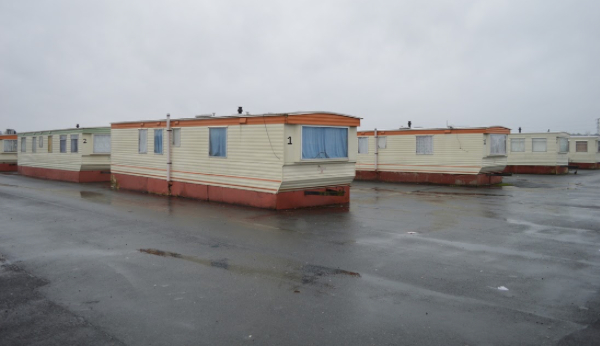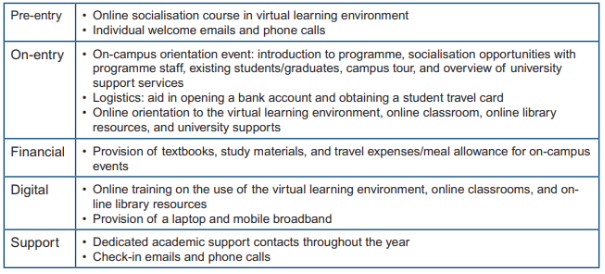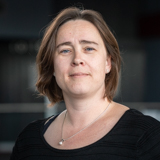This World Refugee Day, 20th June, DCU is pleased to announce a further 30 scholarships for Irish-based asylum seekers and refugees. This blog post reflects on the success of the scholarship programme so far, with a particular focus on the student online learning experience.
 As we recognise World Refugee Day this year, many people welcome the proposed end to Direct Provision, Ireland’s system of accommodating asylum seekers instituted 20-years ago in 1999. The difficult living conditions of people in the Irish asylum seeking community are well documented, but little has been done over the past decade to improve the system of direct provision.
As we recognise World Refugee Day this year, many people welcome the proposed end to Direct Provision, Ireland’s system of accommodating asylum seekers instituted 20-years ago in 1999. The difficult living conditions of people in the Irish asylum seeking community are well documented, but little has been done over the past decade to improve the system of direct provision.
As of January 2018, there were 5,096 men, women and children, including 801 families, living in the 34 direct provision centres across 17 counties in Ireland. Residents spent an average of 23 months in direct provision, while 432 people had been in this system for 5 years or more.

In 2016, DCU became the first Irish university to be designated as a ‘University of Sanctuary’ for its commitment to welcome asylum seekers and refugees into the university community. Since then, the University has offered multiple scholarships to Irish-based asylum seekers and refugees at the third level. In particular, the DCU Connected Scholarships for online study have been well received in part due to the geographically spread location of the direct provision centres.
Generally, Irish-based asylum seekers are not entitled to free higher education, including the opportunity to access Springboard+ courses. Problems faced by those who want to enter third level education in Ireland include lack of access to logistical requirements, financial difficulties, digital competence, recognition of their previous accreditations, and difficulty in finding a sense of community.
 These challenges are illustrated by a team of DCU researchers in the National Institute for Digital Learning (NIDL) who have documented the student experiences of asylum seekers studying under the University of Sanctuary scheme. A recent article appearing in Open Praxis reports a stark divide between their dual identities of being ‘asylum seekers’ and ‘online learners’. According to Dr James Brunton, it was found that identification with the university community was contrasted with ‘disidentification’ with the ‘asylum world’. Importantly, a more connected approach to supporting refugees transition into higher education was found to have a positive impact on their overall online learning experience.
These challenges are illustrated by a team of DCU researchers in the National Institute for Digital Learning (NIDL) who have documented the student experiences of asylum seekers studying under the University of Sanctuary scheme. A recent article appearing in Open Praxis reports a stark divide between their dual identities of being ‘asylum seekers’ and ‘online learners’. According to Dr James Brunton, it was found that identification with the university community was contrasted with ‘disidentification’ with the ‘asylum world’. Importantly, a more connected approach to supporting refugees transition into higher education was found to have a positive impact on their overall online learning experience.

Table 1: Supports provided for online University of Sanctuary scholars
Supports for University of Sanctuary scholars include pre-entry and on-entry actions such as online socialisation courses through the VLE and other targeted services, such as on-campus orientations, logistical aids such as provisions for laptops and broadband, and dedicated academic support throughout the year. Some of these supports and services are outlined in Table 1.
The NIDL research demonstrated the importance of flexible, online, open study routes at higher education levels for underrepresented groups, such as those in direct provision, as a means to reducing some of the major structural, financial, digital, and social barriers typically associated with students in their circumstances. As one research participant said,
“The asylum world is very, very depressing, you’re constantly anxious, you’re constantly in limbo… But again when I flashed back to the support that DCU is giving me, I tell myself no, I cannot let this happen. And so when I think of the support that the DCU family has given me, it’s like a voice talking to me”.
 A more recent publication appearing in Research in Learning Technology reports, according to Dr Orna Farrell, that “one of the challenges of the University of Sanctuary scholarship scheme, particularly for online students, was to ensure the scholars felt a sense of community during their studies”. When asked what made them feel part of the DCU community, one of the participants said:
A more recent publication appearing in Research in Learning Technology reports, according to Dr Orna Farrell, that “one of the challenges of the University of Sanctuary scholarship scheme, particularly for online students, was to ensure the scholars felt a sense of community during their studies”. When asked what made them feel part of the DCU community, one of the participants said:
“I think the services that are offered by DCU. Like it’s like the community within a community that I belong to my own community but then I have the DCU community. Everybody’s welcoming, you are at home.”
The NIDL research team concludes that our qualitative research strengthens the idea that access programmes such as the University of Sanctuary scholarships can facilitate participation in higher education for refugees, and a sense of community, provided the necessary support is in place.
On a personal level, the transformative impact of the DCU Connected Scholarships were vividly illustrated during the Opening Ceremony of last year’s ICDE World Conference on Online Learning. Olufunke Olarinoye, a University of Sanctuary scholar, shared her own brave and emotional story giving a unique insight into the real impact that online education can have on life and the hopes and aspirations of learners beyond the virtual classroom.
This year, DCU is continuing its online study scholarship programme for Irish-based asylum seekers and refugees with 5 DCU Connected and 10 DCU FutureLearn scholarships. Applications are now open and the deadline for submissions is 10th August, 2020.
Further reading
- Brunton, J., Farrell, O., Costello, E., Delaney, L., Foley, C., & Brown, M. (2019). Duelling identities in refugees learning through open, online higher education. Open Praxis, 11(4), 397.
- Farrell, O., Brunton, J., Costello, E., Delaney, L., Brown, M., & Foley, C. (2020). ‘This is two different worlds, you have the asylum world and you have the study world’: an exploration of refugee participation in online Irish higher education. Research in Learning Technology, 20, 1-15.





 Towards the end of Sunday’s pre-conference the
Towards the end of Sunday’s pre-conference the